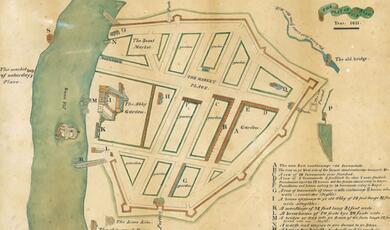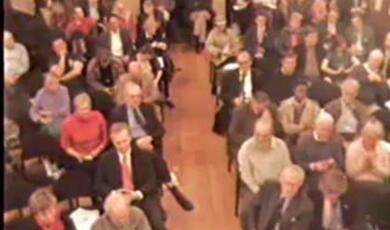Quakers, business and morality
Share
- Details
- Text
- Audio
- Downloads
- Extra Reading
Download Text
QUAKERS, BUSINESS AND MORALITY
Professor James Walvin
A mere century ago, the British people could easily have organised substantial parts of their material lives around the products and services of a number of Quaker commercial enterprises. Financial transactions could have been conducted through a number of Quaker banks (most notably Lloyds or Barclays), confectionery was to be had from a range of Quaker manufacturers (Huntley and Palmer, Carrs, Rowntree, Fry or Cadbury), and shoes could be purchased from Clarks. There were metal goods (notably cutlery) from Sheffield and Birmingham ironmasters, chemical goods (especially soap) from Warrington Quakers. British towns were dotted with Quaker shopkeepers whose main trade was the provision of the basics of British life - notably tea and coffee. The country's major pharmaceutical company was a Quaker foundation. There were major Quaker brewers; corn and grain merchants, railway magnates, engineers, textile manufacturers, printers and publishers, and insurance companies.
It was possible to be drawn along Quaker railway tracks; pulled by Quaker engines, while dressed in Quaker clothing, consuming Quaker food and drink - all paid for by money drawn from Quaker banks. Quaker commercial success appears even more remarkable when set against demographic considerations.
The precise numbers of Quakers have been difficult to gauge (despite the abundance of Quaker data) but it seems reasonably clear that by the time of George Fox’s death in 1691 there were perhaps 66,000 Friends in Britain. A century later the numbers had fallen to c. 30,000 and by the early 19th century the total had dropped below 20,000. 1 By 1861 numbers had fallen to 13,859. But from 1871 to 1901 the fall was arrested and reversed, numbers increasing by a quarter by 1901 (at a time however when the overall population increased by 43%). 2 Whichever period of Quaker history we care to examine, the overall span or more specific time frames, the basic point remains unchanged: throughout their history, British Quakers were always a very small proportion of the overall contemporary population. Thus Quakers exercised an influence which was out of all proportion to their numbers.
Quaker commercial success becomes clear, if we focus our attention on the apogee of Quaker attainments, say by the late 19th or the early 20th century. Those after all were the years when the Society of Friends enjoyed a remarkably efficient networking system. There was, firstly, a national Quaker organisation with powerful provincial communities, which were themselves rooted in an unusually democratic (and literate) process of local management and government, all with important links to a central bureaucracy and decision-making system in London. Moreover this Quaker structure of government was critical for Quaker commercial success, for it eased and facilitated the conduct of Quaker business, enabling Quakers to travel, to find accommodation, and discuss business matters within a sympathetic and encouraging Quaker environment. Put simply, Quaker networks proved vital to the pursuit of Quaker commerce.
From their earliest years, the Society of Friends were noticed for their interest in money-making. In 1697 - only five years after Fox's death - an enemy noted that Quakers had
Grip'd Mammon as hard as any of their Neighbours: and now call Riches a Gift and a Blessing from God. 3
From the first, Quakers were a curious mix. Nor is this simply a modern reaction, for ranks of contemporaries found it difficult to place or understand the Quakers (even in the turbulent confusion of the English Civil War and its aftermath). They were, from the first, distinctive andremained distinctive. As other groups and sects faded, disappeared, changed or accommodated themselves to the post-revolutionary upheavals, Quakers remained recognisably the same. There was no mistaking Friends. They were an unmistakable sight and sound: they alone remained wedded to their distinctive clothing and to a particular form of address and vernacular.
At first, however, the Quakers seemed just one of many groups thrown up by the upheavals of the English Revolution. They had a democratic, levelling tone, attacking privilege of all forms. To their enemies they smacked too much of the Levellers, notably in their refusal to recognise rank, refusing to bow, salute, remove their hats or acknowledge titles. To their enemies, this egalitarianism smacked of disdain. Not surprisingly then, they had a host of political and social enemies even before their commercial successes added the element of envy to their other burdens.
It was, however, their beliefs which incurred the ire of mid-17th century opponents. The Friends had, from their founding days, pursued a distinctive theological route: proclaiming the prospects of salvation for all, and claiming a unity with God; urging, above all, that followers should seek the light of Christ within themselves. It was this inner-spirit, and the rejection of a professional clergy, even the relegation of the Bible itself ( 'a book like any other') which confused and irritated outsiders. Heaven was within the Quaker believer. 4 Quakers cut themselves off, distancing themselves spiritually and culturally from society at large, looking within themselves for the Light and looking to themselves collectively for support and guidance. In the process they regularly pointed out the religious and moral shortcomings of others.
Throughout the 1650s and 1660s the Quakers endured waves of persecutions, imprisonments, personal and communal privations and punishments, which drove them in on themselves turning to each other for succour and practical assistance. It was from these dark days of persecution that there emerged that Quaker self-reliance and tight internal discipline which was to characterise the movement thereafter. In a world where they could not rely on others, on outsiders; they were forced to rely on themselves. When others would not help them, Quakers helped each other. Thus there emerged that personal- and more centrally for our concerns - collective and institutional discipline which became both the structure and spirit of Quaker life.
From the late 17th century onwards unfriendly voices generally described Quakers as people who prospered. Such comments however tend to overlook the large body of Quakers who did not prosper, and who remained ordinary working people, or traders of modest means. To use the Quakers' own terminology, there were many Quakers who were not “in affluence”, though the phrase itself is surely a revealing concept. From the second generation of Quakers onwards – say from the 1680s – contemporaries assumed the Quakers were prosperous, or belonged to a culture which was conducive to material success. True, they were excluded by law (and by choice) from a wide range of social and political activities (Universities, the law, and politics). Whether this exclusionexplains their emergent success seems doubtful. There were other groups who were similarly excluded, but who failed to enjoy such material rewards. We need then to explore the culture of Quakers to tease out what structural and philosophical qualities might have been conducive to their material success.
Studies of provincial Quakers show that members tended to prosper over time. In York for example, local Quakers were described as ‘comfortably off’ (shopkeepers, craftsmen and the like). More than that however, the management and control of local Quaker affairs tended to be dominated by more prosperous Quakers. This is hardly surprising. Poorer people simply did not have the time, social skills or resources to devote to the management of formal Quaker business. Men and women who dominated Quaker affairs tended therefore to be more prosperous Quakers; to be better-off than the rank-and-file.
Despite such differences in their ranks, Quakers remained rootedly egalitarian; similar clothing, humble dwellings, a common vernacular. To be plain, to be simple in all things, was the cultural code of Quakers on both sides of the Atlantic. They were reluctant to spend money on anything but life’s essentials. 5
Quakers were fiercely committed to honesty. In the words of George Fox himself (when haranguing the market traders in Carlisle in 1653):
…they should put away all cozening and cheating, and to keep to yea and nay, and speak the truth to one another. 6
This issue – of honesty in all things – became a refrain in the periodicAdvices issued to Quakers from the London Meetings. It was directed especially at the growing numbers of Quakers involved in business. None should
…launch into trading and worldly business beyond what they can manage honourably and with reputation: so that they may keep their words with all men. 7
One dominant refrain in Quaker instructions was the need to avoid debt. In part this was an understandable concern, shared by all contemporaries, about the risks and dire consequences of bankruptcies. It also helps to explain the speed with which Quakers rushed to help each other financially, or to exclude members who became indebted. Quaker orthodoxy railed against debts, and any failure to pay debts promptly, “to the great scandal and reproach of our holy profession.” 8 Worrying that professional and commercial failure by Friends might bring shame on the Society they appointed experienced Quakers to intervene with advice, and sometimes with money, when they heard rumours of impending trouble.
What differentiated Quakers from other local traders and merchants, however, was that they were not merely responsible to local civic regulations and to market forces, but, more critically, they had to answer for their commercial conduct to the local Quaker Meeting. Quaker businesses, however humble, were scrutinised by other Quakers, to ensure that all was correct and accorded to Quaker conventions, and therefore unlikely to bring discredit or shame on the Quaker community. As more and more Quakers gained commercial or financial experience, there was available, from one community to another, a corpus of local business expertise available for advice, scrutiny, guidance and, if things went wrong, ultimately punishment. Quakers created in effect a system of careful and highly professional accountancy which went beyond the simple statistics of profit and loss, but which ensured that those fiscal details accorded with Quaker precepts.
From the first there were apparent contradictions in this Quaker culture. For a community attached to plainness in all things, Quaker businessmen made great strides in the luxury trades. Quaker shopkeepers were at the forefront of selling imported tropical luxuries - notably tea, coffee and chocolate - along with a range of luxurious clothes, frills and elaborate dress. Some Quaker traders inevitably refused to go the way of luxury. But the consumer revolution of the 18th century was so involved with luxury goods that no ambitious shopkeeper could afford to stand aside. Though Quakers might deny themselves the luxuries enjoyed by their contemporaries, they were ultimately unable to resist trading in those commodities.
Quaker culture proved instrumental in material and commercial advancement. They were, for example, well in advance of any other contemporary Protestant group in emphasising education and training for all their community (boys and girls). From the first, Quakers formed a highly literate society, and sought to provide formal education, through local Quaker schools, for Quakers of all classes. They also provided useful apprenticeships for their offspring, using their contacts forged in business, and at Friends' meetings across the country, to ensure that boys were placed in appropriate apprenticeships - with other Quakers of course. TIme and again, boys from rural and yeoman backgrounds were schooled in shopkeeping and commercial apprenticeships, their Quaker masters ensuring that those youngsters were drilled in the habits of industry and application and shielded from the world at large. Long hours, little free time, insulation from other youths and their pleasures - all and more ensured the raising of new generations of young Quakers steeped in the ethos of sharp-eyed and industrious commerce.
Such apprenticeships were, however, only one means of inculcating Quaker values and habits. Quakers were keen to establish schools for their children, especially for poorer children, but such ventures were generally local and invariably struggled until the creation of the major Quaker Public schools, following the foundation of Ackworth School in 1779. Such schools were important, both in rearing the young into Quaker culture and in shielding them from the outside world.
The Quakers' isolation, and their insistence on remaining true to 'plainness', became ever more unusual in the course of the 18th century as society at large became progressively more influenced by an attachment to material consumption. By 1776, Adam Smith simply assumed that luxurious consumption was built into the fabric of British life. Quakers seemed ever more at odds with the world around them: with their plain clothes, their simple furnishings and aesthetics, and their plain speech. It is true that the regularity of warnings against the temptations of worldliness issuing from the London Meetings suggests that not all Quakers resisted. This was more obviously a temptation among people whose own worldly success was striking, especially among the children of rich Quakers.
Few were wealthier than the Quaker bankers, most of whom emerged in the course of the 18th century through the financial opportunities which were afforded across the country by the transformation of the economy. Quakers were especially adept at transforming themselves from local, often rural businessmen (drapers, millers, corn merchants, brewers, mine owners, textile merchants and many others). About 1750, there were only 12 such country banks. Fifty years later there were 370: a clear indication of the national revolution in banking and finance. 9 It was the opportunities offered by the growing need for secure financial services that enabled Quakers to transform themselves from small local businessmen into major bankers to their rural communities, sometimes into more broadly-based regional bankers and, in a few cases, into major national financial institutions.
As Quakers developed this financial expertise, they also diversified their interests. The Pease family in Darlington emerged from being textile merchants to bankers, amalgamated with other Quaker financiers to become major bankers, then later invested in the new railway companies. Finally they were taken over by another Quaker bank- Barclays. 10 In a similar pattern, the famous Gurneys of Norfolk transformed themselves from wool merchants into local bankers. A group of Welsh Quakers, the Lloyds, were similarly changed from being local iron masters into bankers, firstly to the iron trades, and later to anyone who needed their services.
Time and again, sons were dispatched to another Quaker associate for apprenticeship, before returning to run the expanding family business. In addition, these family businesses were consolidated by that other characteristic Quaker pattern; dynastic marriages between the children of different business families. Quite simply, Quakers married other Quakers. Naturally enough, Quaker businessmen and their wives sought out partners for their sons and daughters both within the faith and within the business fraternity. This was relatively easy to do since they moved so frequently among each other across the country.
Quaker networks were critical. Friends formed a tight-knit community, rooted in a locality, but with important links to the wider region and, via the institutional structure of Quaker life, to other Quakers across the country. Prominent Quakers met each other regularly in London, when provincial Friends invariably took the opportunity to pursue their own interests, as well as take part in Quaker discussions. They told each other of new ventures, and warned against risks and dubious prospects or traders. Moreover this was a network which stretched overseas, for Quakers in North America and the West Indies turned to British Friends for similar help and services. This was especially important in reducing the inherent risks in long-distance and time- consuming overseas trade and business.
There was more to this Quaker business success than mere institutional behaviour, or the self- help common to many other groups. Quakers were honest - and were accepted as honest (even by their enemies). Prudence, truth and frugality all went together - all part of their' calling'. Quaker publications of all sorts regaled readers with the need to discipline themselves to this regime of personal discipline. At every level (home, school, business, in public) Quakers sought to inculcate the duties of honesty in all things. Far from rejecting a wicked world, Quakers, on both sides of the Atlantic, looked on daily toil as the world (to use William Penn's words) " in which men were called to do his Will." 11 Quakers were expected to be honest in their dealings with the state, to pay their taxes promptly and in full, not to buy smuggled goods.
The end result of all this was that all Quakers were under enormous social and community pressures to conform to these rigorous demands; to be honest at all levels, with customers and suppliers, with the state, and to be especially honest (and open) in their dealings with other Friends. Quakers came to be widely- accepted as honest, plain-dealing people, whose word could be trusted, whose goods were exactly what they purported to be (important in the confectionery trades marred by adulteration), whose prices were reasonable, and who offered security for money banked or borrowed. No other group had such a reputation. Moreover it was a reputation which fed on itself At times of uncertainty and frequent upheavals, Quakers could be trusted. Quakers trusted each other, and in time they came to be trusted by outsiders. I ended my book on Quakers by noting that
their produce was sound, their prices fait; their services honest, their word good and their agreements honourable. 12
The range of Quaker commercial and industrial attainments by, say, 1800 was remarkable. It covered major banks, dominance in a number of major industries, and an amazing proliferation of shops and small businesses scattered across the face of urban and rural life. In a society characterised by both Napoleon and Adam Smith as a nation of shopkeepers, Quakers stood out as traders and shopkeepers who could be relied on. In the course of the 19th century, a number of those shopkeepers were to emerge as a new generation of commercial titans: shopkeepers turned chocolate manufacturers. The three manufacturers which dominated the chocolate industry: Fry, Cadbury and Rowntree, whose factories revolutionised their' local communities, had all begun life as Quaker shopkeepers. The Quaker families in those concerns, like their 18th century forebears, accumulated wealth on a stunning scale. But like Quakers before and since, it was money which was generally put to good use, through a series of charitable endeavours (and later trusts) which sought to address many of the social issues which had attracted the interest and efforts of Quakers throughout their history.
Quakers had an enormous impact on the history of British social reform. We now know for example that the initial drive, from 1787 onwards, against the slave trade, was propelled by Quakers. They provided the national netWork for practical organisation (housing travelling speakers, arranging local lectures), Quaker printers and publishers handled abolitionist literature, and the initial abolitionists’ resolve to press ahead came from Quakers. 13 In effect, the early days of abolition evolved almost as an extension of Quaker life and organisation itself.
It is difficult, when considering this small band of godly people whose worldly success was inescapable in Britain in 1800 - or 1900 - to imagine the origins, nature and the sufferings of their forbears in the mid-17 th century. Yet it was in those years, when the Society of Friends emerged from the violence and turmoil of the Revolution, that the basic principles of the Society were forged. But the principles alone do not explain their subsequent commercial success. A major element in that success was the sociology as well as the theology of Quakerism itself. It was the structure of Quaker life, and its ability successfully to acculturate later generations to the values of that community, which provided the means by which initial success was built upon, from one generation to another over a period of two centuries. A failed Quaker was no longer a Quaker. But among the commercially successful were to be found some of the most remarkably influential men and businesses of their various enterprises. To repeat a point made earlier, successful Friends made an impact on the course of modern British economic history out of all proportion to their numbers.
© Professor James Walvin, Gresham College, 25 April 2005
Notes
1. John Stephenson Rowntree, Quakerism Past and Present: Being an Inquiry into the Causes of its Decline in Great Britain and Ireland, London, 1859, pp.71-74.
2. Elizabeth Isichei, Victorian Quakers, Oxford, 1970, pp.112-113.
3. The Snake in the Grass: or Satan Transformed into an Angel of Light, London, 1697, p.xvi.
4. B. Reay, ‘Quakerism and Society’, in J.F. McGregor and B.Reay, eds.,Radical Religion in the English Revolution, Oxford, 1984, p.147.
5. Epistle 1703 and 1754, Epistles from the Yearly Meeting of Friends, I, London, 1858, p.106; 290.
6. The Journal of George Fox, I, Leeds, 1896, p.227.
7. Extracts from the Minutes and Advices of the Yearly Meeting of Friends held in London, London, 1802, p.195.
8. Epistle 1735, Epistles from the Yearly Meeting of Friends, I, London, 1858, p.210
9. L.S. Pressnell, Country Banking in the Industrial Revolution, Oxford, 1956.
10. Ibid, pp. 20, 55, 114, 242.
11. Quoted in Frederick B. Tolles, Meeting House and Counting House: The Quaker Merchants of Colonial Philadelphia, 1692- 1763, Chapel Hill, 1949, p.53.
12. James Walvin, Quakers, op.cit., p210.
13. Mark Jones, The Mobilisation of British Public Opinion against the Slave Trade and Slavery, D.Phil. thesis, University of York, 1998.
This event was on Mon, 25 Apr 2005
Support Gresham
Gresham College has offered an outstanding education to the public free of charge for over 400 years. Today, Gresham College plays an important role in fostering a love of learning and a greater understanding of ourselves and the world around us. Your donation will help to widen our reach and to broaden our audience, allowing more people to benefit from a high-quality education from some of the brightest minds.


 Login
Login







